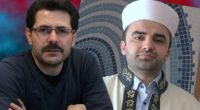Which is the bigger threat, Turkey’s coup or Erdogan’s response?

Date posted: August 1, 2016
Evan Horowitz
Having survived a poorly plotted coup attempt, Turkish President Recep Tayyip Erdogan is consolidating his power and purging the government of anyone considered insufficiently loyal — particularly those associated with the amorphous movement associated with the exiled cleric Fethullah Gulen.
Roughly 18,000 people have been detained since the events of July 16, and another 60,000 government workers have lost their jobs.
This still-widening purge is straining Turkey’s relationship with the West, possibly complicating the fight against ISIS, and raising questions about whether Turkey is drifting toward a Vladimir Putin-style government where power is concentrated in the hands of an authoritarian president.
US leaders have warned that the next US administration will have to reckon with these challenges.
“Many of our interlocutors have been purged or arrested. There’s no question that this is going to set back and make more difficult,” said Director of National Intelligence James Clapper.
What’s happened since the coup?
The counter-coup has advanced remarkably quickly over the last two weeks, spurred on by the decision to declare a temporary state of emergency. Under the new rules, Erdogan has the right to pass laws on his own and the ability to hold people without charge for up to 30 days.
Last Wednesday, 149 generals and admirals were dishonorably discharged, amounting to about 40 percent of the top brass. Below them, thousands of soldiers have been arrested and are currently awaiting trial.
But Erdogan’s post-coup reaction extends well beyond the plotters or the military. Scores of newspapers, magazines, and TV stations have been shuttered. Dozens of journalists have been detained, along with thousands of judges and prosecutors.
What’s more, Erdogan has aggressively targeted the ministry of education, firing 15,000 government employees, closing more than 1,000 private schools, and demanding resignations from 1,500 university deans.
One reason may be ideological: Erdogan is trying to shape the future of Turkish society by changing what young people learn. During his tenure, Erdogan has overseen a massive expansion of religious schools as part of this effort to create a “pious generation” through education. And sealing his control over the education ministry might allow him to accelerate those efforts.
Who, exactly, is Erdogan trying to root out?
Above all, the group Erdogan seeks to purge from Turkish government are the so-called Gulenists; they are the followers of Fethullah Gulen, an exiled spiritual leader who preaches a relatively moderate, business-friendly vision of Islam.
Even before the dust had settled on the Turkish coup, Erdogan was pointing his finger at Gulen. And while there’s still little evidence to support that charge — and some reason to doubt Gulen’s involvement in the coup — rooting out Gulenists in the Turkish government has become a guiding concern.
Gulen does have a large, somewhat cult-like following in Turkey, loosely bound by a network of schools, charities, and other institutions saturated with his message of nonviolent, pious, and democratic Islam.
And like Erdogan himself, Gulen has been playing a long game, educating young people who then carry their Gulenist values wherever they go — including into the military, the judiciary, and various branches of government.
For a time, the Gulenists were allied with Erdogan’s justice and development party, two groups trying to break the hold of secularism and bring Islam deeper into public life. But in 2013, this alliance broke. Since then, Erdogan has come to see the Gulen movement as a threat to his authority and an enemy working from inside the Turkish government.
How has the rest of the world responded?
Turkey has a lot of international leverage. To note just a few examples, Turkey allows the United State to launch regular airstrikes against ISIS from a base inside southern Turkey. And the EU relies on Turkey to help stanch the flow of refugees crossing from Syria into Europe.
Yet, despite Turkey’s regional importance, diplomatic conflict may be hard to avoid if Erdogan’s crackdown continues.
One possible flash point is Gulen himself, who has lived in Pennsylvania since 1999. Turkey has already requested his extradition. If the United States refuses — and the legal grounds for extradition are still uncertain — it could threaten our relationship with Turkey and complicate the war against ISIS.
Where is Turkey headed?
On the economic front, it’s hard to see the tourist industry bouncing back from this latest shock — coming as it does after last month’s terrorist attack at the Istanbul airport.
Also, a purge of this size brings other economic risks. When you fire thousands of government employees, you threaten the quality of government services; and shaking the confidence of Gulenists could ripple through the private sector, where they play a significant role.
Still, the deepest risk may be political. Turkey was already moving toward greater authoritarianism, but the post-coup crisis may help Erdogan further expand his power.
Turkey’s president is supposed to be a figurehead, rather like being the British queen; real power is supposed to rest in the hands of the prime minister.
But Erdogan has already served three terms as prime minister (the party limit), so he’s trying out a political dance that you might call the Putin shuffle — bouncing between different posts and bending the rules to keep running the government, just as Putin did half a decade ago.
To date, Erdogan has struggled to amass enough political support to change the constitution andformalize his powers as president. But now may be his best opportunity.
In that sense, Erdogan’s counter-coup may do more to change Turkish politics than the coup plotters ever sought, completing the country’s transformation from secular democracy to what’s fast becoming the new favorite government for aspiring dictators — one where the media is strictly controlled, conformity is entrenched through the schools, elections bring little change, and presidents can rule for life.
Source: Boston Globe , August 1, 2016
Tags: Fethullah Gulen | Military coups in Turkey | Turkey |
























